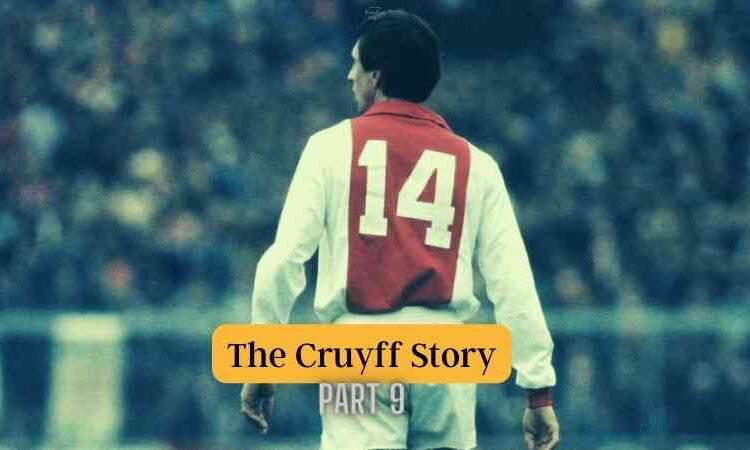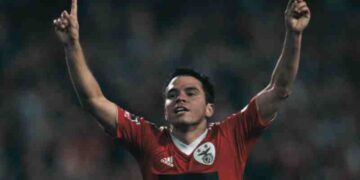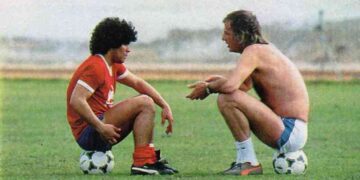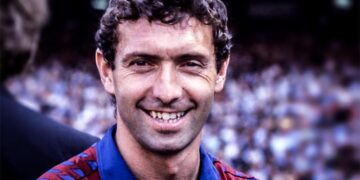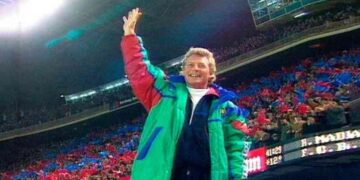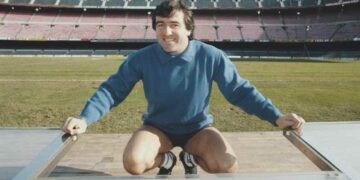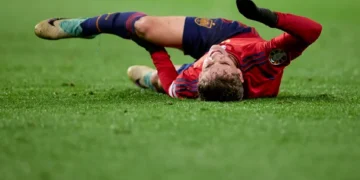‘If the bucket overflows, then I’m reckless. But then I always know what I’m doing, I’ve never gone over the top. For me it’s a bit the other way around: if I’m not fanatical, if I don’t talk passionately, then I’m dangerous. Then you have to be very careful with me.’
From the moment he wiped the entire plate off the table as a skinny street brat when big brother Henny threatened to win a board game, a lot of people have experienced that side of Johan Cruyff. Often they were presidents, such as Ton Harmsen, Josep Lluís Núñez and Judas Joan Gaspart. He argued with national coach George Kessler, with KNVB boss Jos Staatsen and fellow commissioners Steven ten Have and Edgar Davids at Ajax. With referees, or opponents, or with his own players. Even with a bosom friend like Charly Rexach.
This is part 9 of the series of articles we call ‘#TheCruyffStory’.
You have a few romantics who will swear by Piet Keizer until their last breath, and there are a number of stubborn Frisians and Feyenoord fans who still place their Abe Lenstra and Willem van Hanegem on a pedestal. But everyone agrees that Johan Cruyff is The Netherlands’ best footballer of all time and one of the best in the world ever. More famous than Rembrandt or Erasmus, the name Cruyff opens doors everywhere in the world and brings a smile to people’s faces. No, there is hardly any discussion about that. But that does not automatically mean that he was also the most loved.
Money wolf was a word that spontaneously escaped many lips when it came to Cruyff. Or whiner. Even in Amsterdam he was not always that popular. It was so bad at the end of 1981 that the large majority of the Ajax members’ council (16 of the 27, 3 voted blank) decided to issue a negative opinion about a return as a player.
They could not have done Cruyff a greater service.
There is a chuckle in fists everywhere and at newspaper Het Parool they call Cruijff ‘preacher’ when they see him speaking and gesticulating like that on Santa Claus eve.
The newspapers have been full of his financial hardship. His business adventures with his mysterious companion Michel Georges Basilevitch – such as investing in a pig farm – have been disastrous. Some talk about a loss of ten million guilders, Cor Coster keeps it at six to seven million. Although Cruyff claims that his father-in-law does not have the numbers completely in order, no Dutchman doubts that the three-time European Footballer of the Year will return to Ajax out of necessity. But Cruyff doesn’t want to know about that; he says he is not the one who needs to be saved, no, he is the savior.
Cruyff responds with that typical shrug and those downward-drawn corners of his mouth to all the stories that circulate, and fabricates his own story in a dead-hearted way. “I want to work to improve the football product and to sell it better,” he says, “I have gained experience with that in America. I can only do something with my plans if I play myself. That’s why I wanted to go to Ajax. On the field I can convey my thoughts and ideas. My task is to let Ajax perform brilliant positional play again, because that is the most beautiful, but also the most difficult part of the whole thing.’
Unique confidence
He is also full of confidence: ‘I know what is expected of me, every game. I have to prove myself every game. Tomorrow, against Haarlem, it can go wrong of course, but then it will come next week, because I know I can still play football.’
You wouldn’t say it when you see him sitting on the talking chair like that, at the announcement of his comeback as an Ajax player. But he has really been in the deepest shit hole of his active career for some time.
In addition to losing (a significant part of) his assets, a serious muscle injury in his left thigh is bothering him. A stay at Levante in Valencia has ended in failure, both sportingly and financially; the Spaniards turn out to be outright defaulters. And the return to Washington Diplomats has also become a disappointment. But above all: he has not played an official match for more than three and a half months.
Any person with common sense would doubt himself at such a moment. Can I still do it? Am I fit enough to keep up with young super talents like Gerald Vanenburg, Jesper Olsen, Frank Rijkaard and Willem Kieft? Are people still coming to Ajax’s stadium De Meer for me? But Cruyff is different. Think differently.
The End?
‘There will be people who now think that it is over with me’, he says in the Dutch AD newspaper, ‘that I am too old. I don’t feel that way myself. It’s just been a lesser period because of stupid adversity. I didn’t lie awake for a moment either.’
Others do for him. Ton Harmsen, for example, the man who finally stucks out his neck for Cruyff. The Ajax chairman openly wondered for some time whether the stunt was even possible with an almost empty club bank account. ‘Johan doesn’t come for nothing, of course.’ But after Number 14 had agreed with a contract that he would share in the extra income of ticket sales at home games in De Meer, Harmsen even had his own fate tied to that of Cruyff. During a nightly meeting, everything had come around.
But the Ajax chairman remains nervous. He says: ‘If it is really the case that, as Cruyff and his advisers claim, we will attract thousands more spectators because of his arrival, then we can talk about the distribution of the extra money. But I think Cruyff’s arrival with us only has an effect for three or four games.’
No, that’s all, that’s the general expectation. Cruyff’s last international match dates back to October 1977. His last game at a serious level was at Barcelona in May 1978…
But then, his first match for Ajax again, the opponent was Haarlem.
More than 21 minutes, JC doesn’t need a day later to convert everyone again. To make even the greatest unbelievers believe again. Søren Lerby gets the ball. Advances despite strong Haarlem opposition. The sound in De Meer swells. Two weeks earlier, barely nine thousand people had come to the home game against Roda JC. Now the stadium was filled to the brim with 23 thousand spectators. There could have been many thousands more if Ajax had moved to the Olympic Stadium.
Dick Schoenaker has had to give up his place in central midfield to the returned son of Amsterdam, now plays right back and does not believe what he sees. ‘Johan is a kind of myth’, he will stammer afterwards. ‘You even see children of fourteen or fifteen years old who don’t know Cruyff at all… Elderly people, who have not been to a competition for ten years, you now see again. Simple: because they all want to see Cruyff one more time.’
And they get more than value for their money.
About twenty meters from the Haarlem goal, once the Danish captain of Ajax has reached the axis of the field, Cruyff takes the ball from him. In the same movement, immediately leave his first opponent behind him. Haarlem’s central defender Martin Haar will win the Golden Boot that season as Dutch Footballer of the Year, but looks like a pupil playing his first football match. He still stretches all the way, but the almost 35-year-old Cruyff has already flown.
Cruyff has also long seen from the corner of his eye that goalkeeper Edward Metgod has come forward somewhat. And conjures up a magical ball from his right foot. A marker of more than sixteen meters, which seems to linger in the air for seconds.
Silence
Tscheu La Ling looks. And Kieft. Vanenburg. Schoenaker. Peter Boeve. Rijkaard. Goalkeeper Piet Schrijvers. Old friend Wim Jansen. John van ‘t Schip who will make his official debut for Ajax fifteen minutes before time. And in that beautiful red-blue of Haarlem look Ruud Gullit and also goalkeeper Metgod. In short: a team of players who will ultimately be good for 420 international matches for the Dutch team and 23 thousand spectators feel a small trembling of pleasure / admiration when they see the ball pop into the net after a beautiful curve.
Last Dance
Acclamation! De Meer stadium wakes up from a long hibernation. And remains wide awake so as not to miss anything of Cruyff’s full ninety minutes. He tackles, he conducts, he dribbles, he passes with inside and outside foot and after a masterful action also delivers the assist on the 3-0 of Wim Kieft.
Famous Dutch journalist and writer Henk Spaan is one of the people who regularly spontaneously puts his hands in front of the open mouth that afternoon. ‘A fierce flurry of emotion went through me’, he writes in his column innewspaper Het Parool, ‘during the standing ovation that was Cruyff’s reward for this great football language. For the first time since November 1973, an enthusiastic Cruyffie, Cruyffie, sounded through the stadium. With every heel, razor-sharp pass or velvet stroke of that master foot along the arranging leather, people bumped into each other more elatedly. Cruyff could still do it, and how!’
And Danish international Jesper Olsen: ‘I had an idea of what he could do, but this afternoon I occasionally just stood to see what he was going to do again. How fast he is, at that first ten meters. And what movements…’
‘What a revenge’, says newspaper NRC Handelsblad. ‘Especially on everything and everyone who, during his disappointing performance for him both financially and performance at Washington Diplomats, Levante and AC Milan, has portrayed him as a returning money wolf, who has tried to clean up his diminished ability with a minimum of attitude.’
Even Ajax’s members’ council joins the polonaise. ‘We are happy to acknowledge our wrong insight’, says chairman Fischer with a laugh, ‘and as an Ajax player I am very happy with what I have seen this afternoon.’
Still Hero
After the lob, he jumped into the air in an old-fashioned way, with a clenched fist. As he used to do as a young foal in important competitions. Furthermore, Cruyff remains stoic under all the euphoria. Surely he had already said in advance that it would be all right? ‘This will come as a surprise to many. But by no means for me.’
If journalists keep insisting, keep asking questions about his feelings about his regained hero status, he still exposes himself a bit. “Of course it was an exciting day for me,” he agrees. The general opinion was that it would turn out to be a fiasco. There is an awful lot of nonsense written by people who had heard something, but did not know what they were talking about. When I score a goal like that, I have to think about it. Those mouths have been shut down for the time being.’
History has repeated itself, as it will repeat until his death on March 24, 2016. As a player, he deliberately evoked a field of tension many times and then grew to a top performance against the odds.
In his first period at Ajax he did that, it was never quiet around Jopie from Amsterdam, and he won everything there is to win. In Barcelona, he also rose to great heights and now, on his return to the old Ajax nest he did it again. Just as in the last season of his active career, when he was driven almost entirely by feelings of revenge from Ajax to Feyenoord. And made them champion of the Netherlands.
Same vibes as a coach
As a coach/technical director at Ajax and Barcelona, he did not run away from confrontation and continued to use the conflict model. He preferred to bring in players who were in trouble elsewhere or threatened to fail, and therefore had something to make up for. Especially towards those who had kept them small for so long. Think of Michael Laudrup, who failed in Italy, and a mister gunpowder Hristo Stoitchkov.
‘Resentment is also part of top sport’, Cruyff once said. ‘Resentment can be a very good motive. I myself played for Feyenoord fueled by feelings of revenge towards Ajax. It’s a quality you have to nurture.’
Discover more from Barça Buzz
Subscribe to get the latest posts sent to your email.

